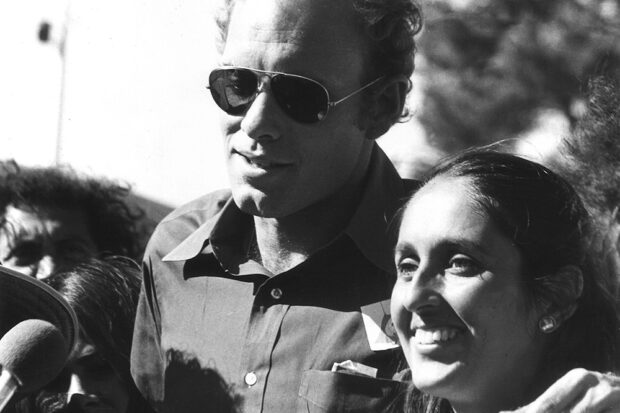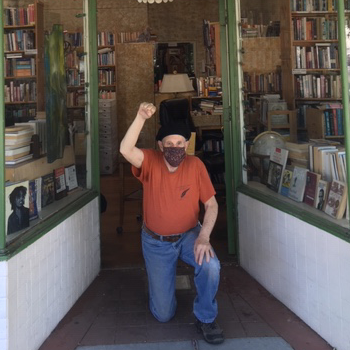
(Editor’s note: David Harris is from Fresno and he went on to become a leader in the anti-draft movement during the Vietnam War. During that time, he was married to folk musician Joan Baez, who played a benefit concert in Fresno that helped fund the local draft resistance movement. Harris passed away on Feb. 6, 2023. Joel Eis was a colleague of David Harris and was an active participant during those antiwar years of the late 1960s and early 1970s.)
On Oct. 26, my wife Toni and I attended the memorial event for David Harris at Stanford University. The memorial was like the needed voice of an old friend in a difficult conversation.
There were perhaps 150–175 people at the Cecil H. Green library, where Harris’s papers will be curated and stored. His last wife and his children were there. All spoke lovingly and profoundly about his life and his character.
Neil Reichline, from Harris’s college days, spoke about his profound effect on our generation even as a college student. There were three profound taped readings from Harris’s work by the actor Peter Coyote, who was not himself there.
Joan Baez was there but did not speak. Her presence was respectful but low key. I spoke with her about the fact that I had pictures of her and Harris from the old days during the Vietnam War at the Fresno Resistance compound on First Avenue if she wanted them. She demurred.
The event leaves me with many thoughts about how we have navigated the long reach from those days until now and our place in the world in the future. As I looked over the crowd, I realized that I had known Harris longer than anyone else in the room, and that I had shared with him the journey of coming to awareness of our place in the sweep of history every step of the way.
Harris was a Buddhist for the last 17 years of hi life. He found Buddhism gave him balance in the storm of entropy that seemed to be washing over our world and our own country. I had also begun to read Zen Buddhist material by Alan Watts and the Beats at the same age. It made me a Zen Marxist with a nonviolent direction.
As I sat in the sun-drenched room full of mostly silver-haired septuagenarians, I remember that all the people I had known who had joined the movement for civil rights and opposition to the Vietnam War did so in reaction to the bankruptcy of traditional religions. We were revolted and angered by the rotten foundation for American politics built on the twisted sentiments of commercialized Christianity, Judaism or nothing at all.
In the waning days of the war and as the civil rights battleground shifted to the courts and legislatures, many of us sought Eastern dogma to frame our need for something new, something positive—or at least neutral—to believe in. We got haircuts and new clothes, new slang and tried to find a positive place in the world to build our karmic investment accounts.
We returned to graduate school and became teachers or artists. Some became medical practitioners or poverty lawyers. Many went to work for nonprofit NGOs. Others packed up their VW van with their “ol’ lady” and toddlers, books, tools and guitars and went back to the land because it was a pure, simple idea they could actually exercise.
Some, like Harris, remade themselves as journalists or authors and tried to build a new world out of words. As we made successes of our lives in material terms, we invested in relatively benign corporations that did not use petroleum or make plastic or weapons or poison the world—or so we thought.

We sought to build a life that did not reek of the stench of greed, bloodshed and hypocrisy. Without naming it, we sought a oneness between our thoughts and actions. That was Harris’s mantra before he even knew the word. I know this because I knew him from the age of 16.
And here we are today. The time between has seen a profound, almost unnamable tectonic shift in the world. Greed and short-sighted self-interest has festered and blossomed with a true vengeance against kindness-seen-as-weakness. It seems that the kind world we worked to bring to birth has all been turned over into something that has truly lost its way.
The idea that what is best for my safety and peace of mind is for me to work to secure your safety and security in the same world is seen as woefully out of fashion. Forgive us the sin of not being in the mode. The world seems almost unrecognizable.
But Harris’s memorial and the vibrant Sartori that was his life—and our lives from that generation—holds for all time one single simple lesson that transcends all faiths, all dogma, all evil exploitation. It remains within each of us to remake our lives as individuals and as a generation-in-time if we all can get clear on imagining the world we want together, roll up our sleeves and build what we imagine with our hearts.
Maybe we ought to put a moment of silence into the Pledge of Allegiance.
In solidarity, carry it on.
*****
After a 35-year career teaching and doing professional theater with a slant toward progressive material, Joel Eis and his wife Toni now own and run a small used bookstore, the Rebound Bookstore (reboundbookstore.com), in San Rafael. The store serves as a progressive “cultural engine” for the community.

